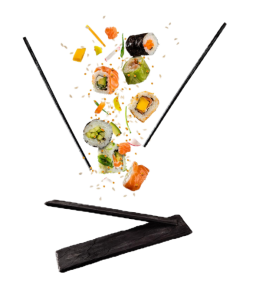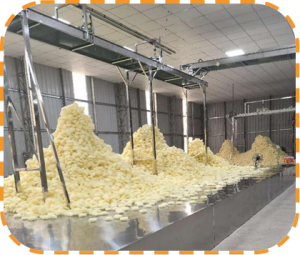Product Information
In Japanese, it is called kanikama (カニカマ), a portmanteau of kani ("crab") and kamaboko ("fish cake"). In the United States, it is often simply called kani.
The Japanese company Sugiyo first produced and patented imitation crab flesh in 1974, as kanikama. This was a flake type. In 1975, the company Osaki Suisan first produced and patented imitation crab sticks. Frozen crab sticks are used in sushi, salads, fried in tempura, and many other dishes.
This is crab-flavored kamaboko made from fine-fiber fish meat. After opening the package, loosen layer by layer, remove the wrapping paper, cook, and enjoy. This product uses natural pigments. No fungicides or preservatives are used, so you can enjoy it with confidence. Versatile, it can be pickled or served with salads, chawanmushi, soups, and more.


Ingredients
Fish meat (Tara), egg white, starch (including wheat), crab extract, salt, fermented seasoning, shrimp extract, seasoning (amino acid, etc.), seasoning, red pepper pigment, emulsifier
Nutrition
| Items | Per 100g |
| Energy (KJ) | 393.5 |
| Protein (g) | 8 |
| Fat (g) | 0.5 |
| Carbohydrate (g) | 15 |
| Sodium (mg) | 841 |
Package
| SPEC. | 1kg*10bags/ctn |
| Gross Carton Weight (kg): | 12kg |
| Net Carton Weight (kg): | 10kg |
| Volume(m3): | 0.36m3 |
More Details
Storage:At or below -18°c.
Shipping:
Air: Our partner is DHL, EMS and Fedex
Sea: Our shipping agents cooperate with MSC, CMA, COSCO, NYK etc.
We accept clients designated forwarders. It’s easy to work with us.
Why Choose Us
20 years Experience
on Asian Cuisine, we proudly deliver outstanding food solutions to our esteemed customers.


Turn your own Label into Reality
Our team is here to assist you in creating the perfect label that truly reflects your brand.
Supply Ability & Quality Assurance
We’ve got you covered with our 8 cutting-edge investment factories and a robust quality management system.


Exported to 97 Countries and Districts
We have exported to 97 countries worldwide. Our dedication to providing high-quality Asian foods set us apart from the competition.
Customer Review



OEM Cooperation Process








